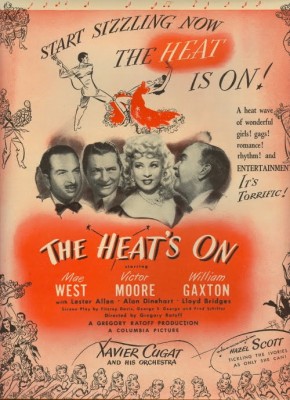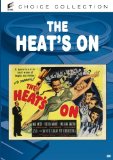| Reviews & Columns |
|
Reviews DVD TV on DVD Blu-ray 4K UHD International DVDs In Theaters Reviews by Studio Video Games Features Collector Series DVDs Easter Egg Database Interviews DVD Talk Radio Feature Articles Columns Anime Talk DVD Savant Horror DVDs The M.O.D. Squad Art House HD Talk Silent DVD
|
DVD Talk Forum |
|
|
| Resources |
|
DVD Price Search Customer Service #'s RCE Info Links |
|
Columns
|
|
|
Heat's On, The
West reportedly didn't want to make The Heat's On, a Columbia production, and only agreed after much pleading from producer-director Gregory Ratoff. Although she found later success again starring on Broadway, staged a popular Las Vegas show and appeared on television sporadically (including, bizarrely, an episode of Mister Ed), Mae vanished from the screen until 1970, when she starred in the infamously awful adaption of Gore Vidal's satirical Myra Breckinridge. Even more alarmingly, at the age of 85 she starred, unsteadily and practically mummified, in one final film, Sextette, still playing an irresistible sex symbol men 50 years her junior want to bed down. Available on DVD, Sextette is in its own way utterly beguiling.
But West was merely 50 when she made The Heat's On and, unlike the embalmed drag queen she resembled in Myra Breckinridge and Sextette, she looks her age and wears it well, though her sexiness is debatable. Regardless, the movie doesn't serve her well at all. She shares top billing with co-stars Victor Moore and William Gaxton, big stage stars less known for their movies, and Mae's role is really an unmemorable supporting one.
A manufactured-on-demand, Sony "Choice Collection" release, The Heat's On is a decent black and white, full-frame transfer bereft of extra features or even menu screens.
Broadway producer Tony Ferris's (William Gaxton) latest show, Indiscretions, is having financial trouble and also running afoul of local censors, largely due to the suggestive dancing and double-entendres of star Fay Lawrence (Mae West). Unhappy to be appearing in such a troubled production, Fay breaks her long partnership with Tony and goes to work for a rival producer, Forrest Stanton (Alan Dinehart).
Tony visits the Bainbridge Foundation, a public decency watchdog organization headed by sanctimonious Hannah Bainbridge (Almira Sessions). When she's away at a convention in Seattle, her milquetoast brother Hubert (Victor Moore) asks Tony to find a spot in his struggling show for Janey (Mary Roche), Hubert's niece. Tony, learning that Hubert's been put in charge of the foundation's $400,000 war chest while Hannah's away, plots to have him unwittingly embezzle the money and thus allow Tony to essentially take over Tropicana, the same Latin-themed show Stanton has been developing as a vehicle for Fay.
As you might have noticed, Mae West's character is incidental to the plot. Story-wise she's pretty much off on the sidelines until the climax, when she comes to the rescue, does a brief if big-scale number at the finish and the movie abruptly grinds to a halt.
The rest of the time she's mostly playing third fiddle to loveable Moore and fast-talking Gaxton, who were unofficially teamed on the stage frequently, though this was their only feature together. West also fights for screen time with various Latin and jazz performers, notably bandleader Xavier Cugat and vocalist Lina Romay, and jazz pianist and singer Hazel Scott, whose "The White Keys and the Black Keys" is the film's musical highlight.
West wrote or co-wrote most of her films but clearly didn't have a hand (or much of one) in The Heat's On. The only scene in the picture that uses her well is when star-struck Hubert, sporting an obvious toupee, calls on her in her lavish apartment. Her amused expressions at Hubert's awkward innocence are rather charming. Fay (putting on a record): "Would you like to cut a rug?" Hubert: "Oh, no. The rugs are too expensive" (a line only Moore or maybe Stan Laurel could make endearing). The one solid laugh in the picture comes not from Mae West but rather Moore when, drunk on Fay's liquor, Hubert unwisely tries to impress her with his jitterbugging.
Video & Audio
Time Out for Rhythm looks just fine, with reasonably impressive detail, rich blacks, and good contrast throughout, though I did notice a weird video glitch at the 11:06 mark. The audio, English only with no other choices and no subtitle options, is likewise strong. There are no menu screens; the movie simply begins then restarts automatically after it's done. The disc is region-free. No Extra Features.
Parting Thoughts
Not good but worthwhile for Victor Moore, for the music and especially Hazel Scott, and as a cinematic footnote in the long career of one-of-a-kind Mae West. Recommended.
* Sergei Hasenecz writes, "I would argue that it was the Production Code only. Unable to be as bawdy as she had been in pre-code, West's movies fail to deliver exactly what her audiences came to see her for. She does one movie in 1932 where she is famously in support of George Raft. ('Mae stole everything but the cameras,' is Raft's oft-quoted and admiring remark.) Beginning in 1933 she is the lead in seven features for Paramount: two in 1933, one each in 1934 and 1935, two in 1936, and one in 1937. Not a sudden and sharp decline but rather, it seems to me, a slow three-year falling away of the audience post-code."
Stuart Galbraith IV is a Kyoto-based film historian whose work includes film history books, DVD and Blu-ray audio commentaries and special features. Visit Stuart's Cine Blogarama here.
|
| Popular Reviews |
| Sponsored Links |
|
|
| Sponsored Links |
|
|
| Release List | Reviews | Shop | Newsletter | Forum | DVD Giveaways | Blu-Ray | Advertise |
|
Copyright 2024 DVDTalk.com All Rights Reserved. Legal Info, Privacy Policy, Terms of Use,
Manage Preferences,
Your Privacy Choices | |||||||















